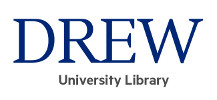 Library Guides
Library Guides Library Guides
Library Guides
Academic Support Services
The Center for Academic Excellence (CAE) offers support resources for all Drew students at no extra cost with units dedicated to helping you with writing, math, science, and academic coaching.
Students may make tutoring and writing help appointments using WCOnline, the CAE’s appointment scheduler. Remote and in-person options are available. Review these instructions to learn how to schedule and access your remote session. Or, for more information on tutoring resources, please email cae@drew.edu.
Below please find a review of the resources available to you:
Subject tutoring is available for most CLA courses and the CAE makes every effort to arrange for tutoring in other courses through special requests.
The University Writing Center (UWC) offers undergraduate and graduate students one-on-one or group support for writing. The UWC also offers thesis and dissertation support.
Academic coaching is available to assist undergraduate and graduate students who seek to improve their study and self-management skills. If you are concerned about your ability to take notes, and stay organized and focused in the online learning environment, you may benefit from academic coaching
Ready to make an appointment for tutoring, writing support or academic coaching? Book today at WCOnline.
For more information or clarification on any of the resources listed, please email cae@drew.edu.
Before you use a source, you should check to see if it seems credible and relevant to your topic. Use the title, abstract, publication and author information to see if a source looks promising, then read the text carefully, considering whether it is appropriate for your paper.
For instance, when searching for sources for an academic paper, you're usually looking for:
It's up to you to decide whether a source is useful; but your professor and the librarians can help you. Don't hesitate to ask!
Questions? Need Help? Email reference@drew.edu
Drew University Library, http://www.drew.edu/library